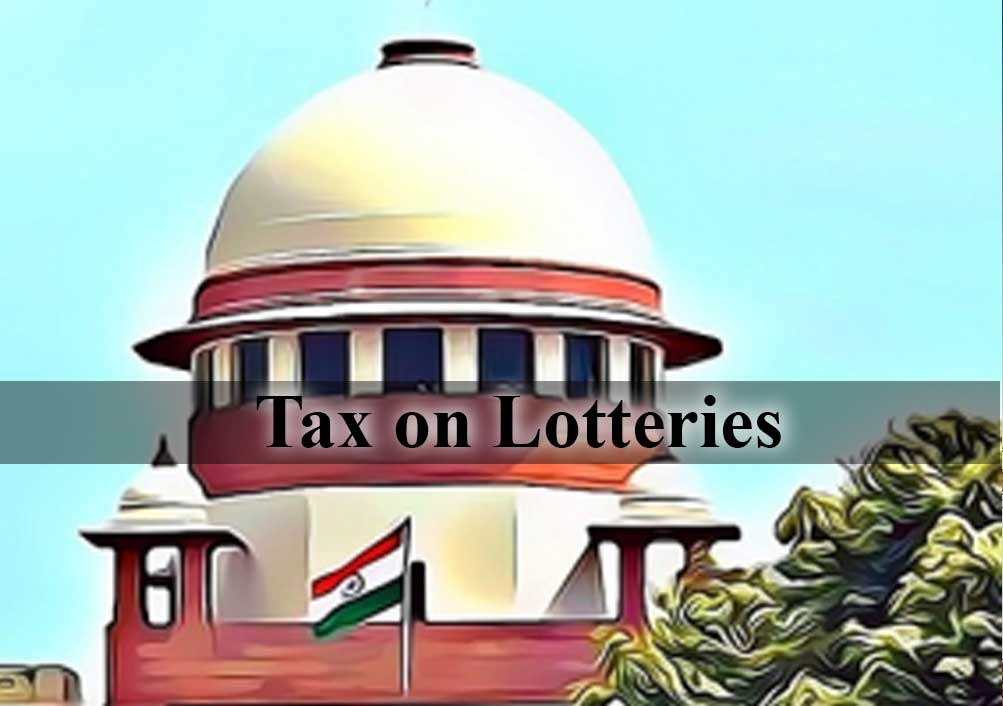State Legislatures competent to impose tax on lotteries conducted by other States, says SC; upholds validity of Lotteries Taxation Acts of Karnataka & Kerala

Read Judgment: State Of Karnataka & Anr. Etc v. State Of Meghalaya & Anr. Etc
LE Correspondent
New Delhi, March 24, 2022: Declaring that the State Legislatures have the power to tax lotteries under Entry 62 of List II of the Seventh Schedule of the Constitution of India, the Supreme Court has held that if lotteries are conducted by private parties or by instrumentalities or agencies authorized by the Government of India or the state government, it would come within the scope and ambit of Entry 34 of List II.
The Division Bench of Justice M.R. Shah and Justice B.V. Nagarathna allowed the appeals preferred by the States of Karnataka, Kerala and others being aggrieved by the judgments passed by the Division Benches of the High Courts of the respective States whereby it was held that the respective State Legislatures had no legislative competence to impose tax on the lotteries conducted by other States in their State (in the State of Karnataka and Kerala respectively) and it was directed that the amounts deposited by the respondent-States who had organised the lottery schemes be refunded to them.
The controversy in this matter primarily revolved around the interpretation to be given to the expression ‘betting and gambling’ in Entries 34 and 62 of List II of the Seventh Schedule of the Constitution of India and the legislative competence of the State Legislatures to levy tax on lotteries organised by the Central or the state government of a State.
Upholding the validity of Karnataka Tax on Lotteries Act, 2004 and Kerala Tax on Paper Lotteries, Act, 2005, the Bench held that Legislatures of the State of Karnataka and Kerala were fully competent to enact the impugned Acts and levy taxes on the activity of ‘betting and gambling’ being organised and conducted in the said respective States.
The Apex Court was of the view that in the context of lotteries, the organisation and conduct of a lottery scheme being a pan India activity, when any State Government permits the Government of India or any other State Government to organise the lottery scheme in that State, Entry 62 of List II would enable the Legislature of that State to levy taxes on the same.
Affirming that ‘lotteries’ is a species of gambling activity, the Bench deduced that lotteries is within the ambit of ‘betting and gambling’ as appearing in Entry 34 List II and added that under Entry 62 of List II, the specific power to tax an activity which is ‘betting and gambling’ is reserved with the State legislature and cannot be read within the scope and ambit of Entry 40 of List I which is inherently restricted in its scope.
Elucidating further on the taxing power, the Court noticed that a taxation entry or legislative power to levy a tax on ‘betting and gambling’ in the instant case, cannot be split between the Parliament and the State Legislature when the said power is expressly enumerated in Entry 62 of List II. This is the constitutional scheme under the three Lists and the same is also evident on a perusal of the Entries of List III (Concurrent List) which empowers both the Union as well as State Legislature to enact laws on subjects mentioned therein and the powers to levy a tax is conspicuous by its absence, added the Court.
The Bench added that lotteries organised by the Government of India or the Government of a State is only excluded from Entry 34 of List II which deals with ‘betting and gambling’ only, for the purpose of regulation by the Parliament and not for levy of tax.
According to the Top Court, Entry 40 of List I is meant only for the regulation of lotteries organised by the Government of India or the Government of a State. The said Entry cannot be expanded to cover the power to levy taxes on lotteries by the Parliament when as such a power is envisaged in Entry 62 of List II. The Parliament, therefore, cannot tax a gambling activity, namely, organisation of lotteries conducted by the Government of India or for Government of a State on the strength of Entry 40 of List I. It may however regulate the said activity.
The Bench went on to add that the scope and ambit of lotteries organised by Government of India or Government of State under Entry 40 of List I is only in the realm of regulation of such lotteries. The said Entry does not take within its contours the power to impose taxation on lotteries conducted by the Government of India or the Government of State.
Thus, the Top Court granted relief to the States of Karnataka and Kerala by allowing the Appeals and setting aside the impugned judgments passed by the Division Benches of the High Courts of the respective States.
Sign up for our weekly newsletter to stay up to date on our product, events featured blog, special offer and all of the exciting things that take place here at Legitquest.




Add a Comment